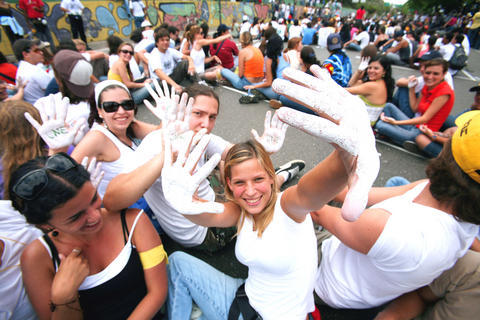The head of the Organization of American States (OAS) opened a hemispheric summit late on Sunday with a warning against "silencing" political opponents, a week after Venezuelan President Hugo Chavez shut down an opposition television station.
"The first duty of a democratic government is broadening democracy," OAS Secretary General Jose Miguel Insulza told delegates at the organization's 37th General Assembly.
"By contrast, if a government is silencing opponents, excludes them from the political process and resorts to repression, it embarks on a path toward certain weakening of democratic rule," Insulza added without mentioning Chavez directly.

PHOTO: AFP
He urged Latin American nations to promote a climate of tolerance as they confront multiple political, economic and social challenges.
Venezuela's oldest and most popular television channel, RCTV, went of the air a week ago, after Chavez refused to renew its broadcasting license, accusing the station of subversion.
The country has been in turmoil ever since, with thousands of students and other opponents of Venezuela's mercurial ruler taking to the streets to protest the move.
Thousands of demonstrators marched in Caracas again on Sunday, slamming Chavez's shutdown of RCTV that openly called for his ouster in 2002, during a two-day coup bid against him that ultimately failed.
Tooting whistles and waving Venezuelan flags, demonstrators also spoke out noisily against government ombudsman German Mundarain, who on Friday endorsed Chavez's move.
He also suggested there was a link between protesting students and parties who might be trying to topple leftist Chavez.
On Saturday, hundreds of thousands of Chavez backers marched in a show of support for his controversial maneuver, now an international scandal.
The conflict has spilled over into the halls of the OAS assembly, where a group of former employees of the defunct network is lobbying foreign ministers, urging them to hold a full-scale debate on the situation in Venezuela.
They have enjoyed tacit support from the US, which has submitted to the OAS Permanent Council a statement by the US Senate, in which the upper chamber of Congress urged the OAS to come up with a response to Chavez's decision.
But while not ruling out changes in the assembly's agenda, Insulza told reporters at the start of the meeting that so far, no member nation has presented a formal request that the issue of RCTV be discussed at the forum.
Venezuela's OAS representative, Jorge Valero, said on Saturday that a discussion of RCTV's closing would be considered "interference" in Venezuela's domestic affairs.
But he later said such a debate, if it were to occur, will give Venezuela "an excellent opportunity" to explain its government's action.

North Korea blew up sections of roads in its own territory that are part of links once used to connect the southern part of the peninsula with the north, in a show of defiance after it accused Seoul of flying drones over Pyongyang. North Korea detonated bombs north of its eastern and western borders at around noon yesterday, South Korea’s Joint Chiefs of Staff (JCS) said. South Korea’s military later fired off warning shots within its border, said the JCS, which also confirmed there were no reports of damage in South Korea from the detonations. A video released by the South Korean

It is usually a serene two-and-a-half-hour ride on Japan’s famously efficient bullet train, but on Saturday, the journey quickly descended into a zombie apocalypse, with passengers screaming in terror. Organizers of the adrenaline-filled trip, less than two weeks before Halloween, touted it as the world’s first haunted house experience on a running Shinkansen. On board one chartered car of the Shinkansen, about 40 thrill-seekers were ready to brave an encounter with the living dead between Tokyo and the western metropolis of Osaka. The eerie experience was inspired by the hit 2016 South Korean action-horror movie Train to Busan, in which a father and

A member of chart-topping K-pop group NewJeans yesterday tearfully testified to South Korean lawmakers as part of an inquiry into workplace harassment, amid a boardroom drama over her super producer. In recent years, South Korea’s K-pop industry has become a global juggernaut powered by the success of groups like BTS, but domestically it is known for imposing strict standards and controls on fledgling stars. Rising K-pop idols are expected to adhere to their powerful agency’s behavior and appearance guidelines, with many stars describing receiving extreme backlash from fans over perceived mistakes in their personal lives, for example dating. Hanni, 20, who is

IRANIAN THREATS: Revolutionary Guards chief Hossein Salami said that it would be a ‘mistake’ for Israel to attack Iran and if it did ‘we will strike you again painfully’ Israel yesterday bombed a Syrian coastal city, while the US conducted multiple strikes on targets in Yemen nearly a month into Israel’s war with Hezbollah in Lebanon. Syria, the Houthi rebels in Yemen, Hezbollah and Hamas in Gaza all belong to the so-called “axis of resistance” led by Iran, which on Oct. 1 conducted a missile strike on Israel. Israel has vowed to retaliate for the strike. Iran’s Revolutionary Guards chief Hossein Salami yesterday said in a speech that Tehran would hit Israel “painfully” if it attacks Iranian targets. “If you make a mistake and attack our targets, whether in the region or in